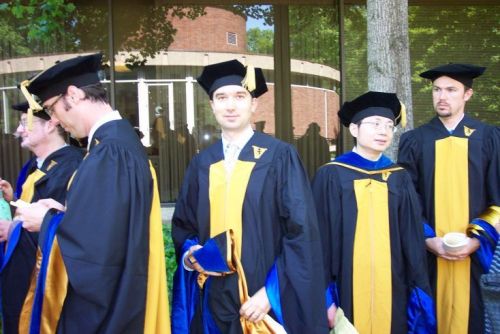Top Ranking for Our Graduate Program in New NRC Report

The Ph.D. program of the Vanderbilt mathematics department received high ratings in a new report from the National Research Council (NRC) that offers insights into the quality of doctoral programs in mathematics at research universities in the United States. Released in September 2010, the new report no longer provides a definite ranking of programs, but various analyses of the data places our program at number 16 in the so-called S ranking, and at number 31 in the R ranking (see http://chronicle.com/article/NRC-Rankings-Overview-/124743/ for a sortable list). Thus, in both of these rankings, our department fares dramatically better than in the 1995 NRC ranking, which placed us at number 84.
Given that graduate education is a top priority for Vanderbilt, this steep ascent by our department is hardly surprising. For the last decade, Vanderbilt has been devoting increasing attention and resources to its Ph.D. programs throughout the entire campus, says Dennis Hall, vice provost for research and dean of the Graduate School. All of that effort and emphasis has placed graduate education at Vanderbilt on a steep upward trajectory.
Math Department Chair Dietmar Bisch adds, “Our department scored highly in several categories that indicate the high quality of our faculty, including percentage of faculty with research grants and publications per faculty. It is exciting for us to receive this recognition in one of the most anticipated evaluations of Ph.D. programs in mathematics.”
This latest NRC report is based on data collected from 127 Ph.D. programs in mathematics during the 2005-2006 academic year. The data was gathered on 20 key characteristics identified by the NRC as indicative of the quality of Ph.D. programs, including:
* Publications per faculty member
* Citations per publication
* Percent faculty with grants
* Awards per allocated faculty
* Average GRE-quantitative score
* Percent 1st-year students with full support
* Percent 1st-year students with external funding
* Percent female students
* Annual average number of Ph.D.s 2002 to 2006
* Time to degree
* Percent students in academic positions
* Student work space
The report provided two overall rankings, the S (survey-based) ranking and the R (regression analysis-based) ranking, to illustrate how the data collected can be interpreted. For each ranking two numerical values were computed. These two values correspond to the ranking percentiles, namely the 5th percentile and the 95th percentile.
Thus, for example, in the so-called “S ranking” of the report, perhaps the most important ranking, measuring the overall quality of the program, our department was ranked by the two values 11 and 31. What does this mean? The S ranking is based on a survey that asked faculty (the raters) in mathematics to rate the importance of the twenty NRC selected criteria. Based on the answers of 50% of randomly selected raters, weights for each criterion were computed, and these weights were then applied to the data of each of the 127 Ph.D. programs in mathematics to produce a numerical ranking. The process was repeated 500 times and 450 of these computations resulted in numbers between 11 and 31 for our program. This places us between the top 9% and the top 24% of the 127 departments ranked. In the so-called “R ranking,” a different way of computing weights for the NRC criteria, these two numbers were 17 and 48.
The Vanderbilt mathematics program fares particularly well when compared to other Ph.D. programs at Vanderbilt. For instance, the S ranking places us among the top ten programs university wide, and among the top four in the College of Arts & Science.
In addition to the above two rankings, there were also three so-called dimensional rankings, concerned with Research Activity, Student Support and Outcomes, and Student/Faculty Diversity.
The entire NRC data set can be downloaded from the website http://www.nap.edu/rdp.